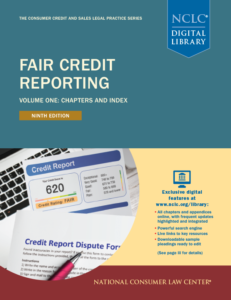Mistakes on criminal background check reports continue to cause many thousands of people to be denied jobs and housing and skirt federal law (Fair Credit Reporting Act). Federal and state government and the courts each have a role in improving the accuracy of background checks.

Published December 9, 2019
National Consumer Law Center©
Background
NCLC’s ground-breaking 2012 report on criminal background checks detailed an industry-wide lack of accountability and incentives to cut corners that meant consumers paid for these third-party errors with their jobs while employers waste money and miss out on hiring qualified employees. Since then, advocates have litigated many class action and individual lawsuits against background screening companies for violations of the Fair Credit Reporting Act (FCRA). Both the Federal Trade Commission (FTC) and the Consumer Financial Protection Bureau (CFPB) have brought actions resulting in settlements requiring background screening companies to reform their procedures and practices and pay millions of dollars in civil penalties and in relief to harmed consumers.
Despite these efforts to improve background check reporting, companies continue to generate inaccurate reports that have grave consequences for consumers seeking jobs and housing. This report investigates common poor practices and mistakes and offers best practice suggestions for background screening companies and recommendations for policymakers, including Congress, federal agencies, and state governments. Federal and state actors must take action to stop inaccurate and incomplete reports and to hold background screening companies accountable. It is essential that deficient screening practices be stopped so consumers are not guilty until proven innocent.
A significant number of adults living in the United States are affected.
- About 94% of employers and about 90% of landlords use criminal background checks to evaluate prospective employees and tenants.
- About 1 in 3 adults (between 70 million and 100 million people) in the U.S. have a criminal record.
- Many additional people without a criminal record are wrongly tagged as having a record.
The problems are industry-wide.
There are no licensing requirements for criminal background screening companies. Anyone with a computer and access to records can start a business; an industry analysis estimated there were 1,954 background screening companies in 2019.
There is no central system for registration for background screening companies. A consumer can’t regularly order their own report to review for errors as there is no central source to find and request a copy.
Many companies attempt to skirt the federal Fair Credit Reporting Act (FCRA), including by subcontracting work to vendors or disclaiming responsibility.
Employers often fail to comply with the FCRA. This makes it difficult to know whether consumers were denied employment due to a background check report.
Many screening products are now designed to automate and outsource decision making to the background screening company. Employers and landlords may no longer individually assess or make judgment calls about applicants. And applicants who otherwise would have been accepted are excluded, and employers and landlords miss out on qualified employees and tenants.
NCLC’s research reveals that criminal background screening companies continue to generate reports that:
- Mismatch the subject of the report with another person (e.g., listing criminal records belonging to someone else, often harming consumers with common names in particular);
- Include sealed or expunged records (e.g., listing a conviction that was legally removed from the public record);
- Omit information about how the case was resolved (e.g., failing to report that charges were dismissed);
- Contain misleading information (e.g., listing a single charge multiple times); and/or
- Misclassify the offense reported (e.g., reporting a misdemeanor as a felony).
Many errors are due to common poor practices by background screening companies, such as:
- Using over-inclusive or unsophisticated matching criteria;
- Failing to verify information obtained through vendors or other faulty sources;
- Using incomplete data (e.g., missing personal identifiers or disposition information);
- Retrieving data in bulk and then failing to routinely update the database;
- Failing to utilize all available information to prevent a false positive match;
- Misunderstanding state-specific criminal justice procedures and laws.
Recommendations
The National Consumer Law Center report recommends that Congress, federal regulatory agencies, and states use their authority to rein in industry-wide problems (see pages 32-40) of full report for complete recommendations).
- Congress should amend the Fair Credit Reporting Act, or FCRA (enacted in 1970 by Congress to protect the privacy of consumers) to increase protections for prospective tenants and give the Federal Trade Commission specific supervisory authority over background screening companies.
- The Consumer Financial Protection Bureau (CFPB) should issue regulations under the FCRA to ensure greater accuracy of background checks. The CFPB should also require consumer reporting agencies to register so consumers can more easily correct inaccurate and misleading information.
- The CFPB and the Federal Trade Commission should continue to use their enforcement powers to investigate major background screening companies for FCRA violations. These federal agencies should also investigate nationwide employers for compliance with the FCRA requirements for users of consumer reports for employment purposes.
- States should pass legislation requiring users of background check reports to review the underlying report produced by the background screener before making an employment or housing decision. States should also require companies that receive bulk data from court databases to promptly delete sealed and expunged criminal records and routinely update their records. States should revoke a company’s ability to receive data if an audit reveals that the company is not in compliance.
-
State attorneys general should investigate background screening companies, and any remedies should require background screening companies to implement specific reforms.


